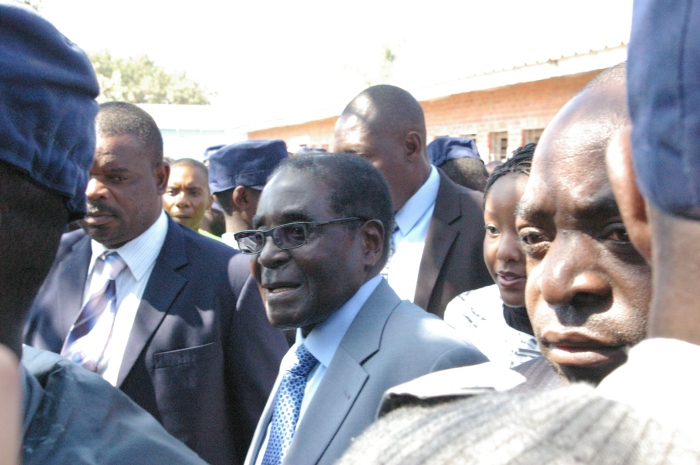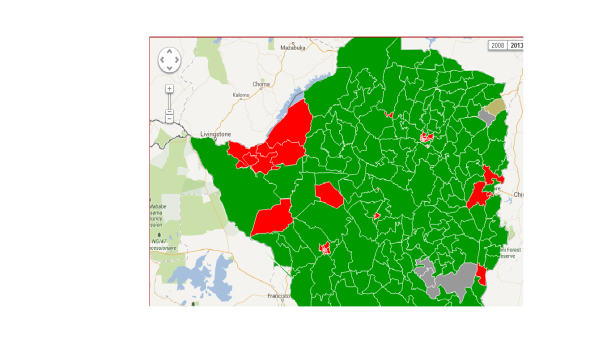61%.
That was how much of the vote 89 year old Robert Mugabe received. I say Robert Mugabe and not Zanu-PF, his political party, because he IS the party. There is only one face, only one voice and only one fist that matters. The face is of a man used to power, a face adeptly able to hide the violence, anger and manipulation it wields so well behind a curtain of feigned innocence and charm. The voice, rolling off a forked tongue fooling anyone naive enough to succumb, loud and unwavering in its old age, able to command from behind any pulpit. And the fist, forever clenched, beating into submission those who oppose, a bastion of fear and intimidation representing the man’s iron grip on his people.
This is President Robert Mugabe and this is how he won. Again.

Mugabe, surrounded by police and private security, leaving Mhofu Primary School after he cast his vote
The air was cold and I was shivering in just my button up shirt and jeans. It was early in the morning and as I made my way to the office the streets were empty. A thick layer of impenetrable grey cloud filled the sky and small groups of men could be seen lighting fires on the side of the road, huddling together to keep warm.
It was election day. The day of reckoning the people of Zimbabwe, and over 3 million Zimbabweans living abroad, had been waiting for for the past five years. It was difficult to grasp that it had finally come. I had been in Zimbabwe for just over a month and I had rarely had a conversation that didn’t somehow revolve around what would emerge from this day.
Elections happen all the time. Countries the world over are constantly electing new leaders, but this was not just another election. I have lived through and participated in many elections back in Canada and have closely followed important elections in other countries for a while now but this felt different. Whether or not it was because I was there, fully immersed in the fervor of it all, or because I somehow felt I had a vested emotional interest in the outcome despite my inability to do anything about it, I’m not sure. Whatever the reason, the fact that these elections would be the most important the country had ever faced, and one of the most important the Continent had ever faced, was undeniable.
I was heading to Mbare, Zimbabwe’s oldest township, located just a few kilometers outside of Harare’s city centre. It’s one of the poorest and most densely populated areas of the capital where multiple generations of families often cramp themselves into small apartments.
Anticipation for these elections had been high and the time for talk and discussion was over. It was time for the people to mobilise and have their voices heard. As we drove through the narrow dirt alleyways of Mbare, passing the small crumbling brick houses seemingly built wherever space could be found, we could already see people walking in groups to the polling stations.
As we approached the first station, in an open field within the shadows of Rufaro Sports Stadium, long, winding lines of voters had already formed.












There were hundreds of people, even at this early hour, but it was silent. The only sounds were of hushed whispers, as if people were afraid to speak. It made for an eerie scene of people shuffling along in silence, one slow step after another, under the watchful eye of police and election observers.
As I stepped into one of the voting tents I had to give my eyes a moment to adjust to the darkness. It was an overcast morning and any light seeping through the clouds was obstructed by the green tent. A small lamp burned on a nearby table casting strange shadows on the tent walls. People were entering the tent, handing over their ID’s to an election official who would find it on the ward’s voting roll. They would then go behind a cardboard partition and mark an ‘X’ next to their candidate’s name. The voter would then head to the other side of the tent where their little finger was dyed pink, to show he/she had voted, a preventative measure to protect against double voting.
One boy, Darlington Makiwa, was voting for the first time. He stood in line, close to the entrance of the tent, his father’s hands placed affectionately on his shoulders. He had truly dressed for the occasion. Whereas some were simply dressed in whatever would keep them warm, 21 year old Darlington wore freshly polished black shoes, pressed grey dress pants, a white shirt with a white and pink stripped tie around his neck. A sweater with black and white diamond shapes completed his election day ensemble making him look a little out of place standing in the cold, dirt square. He had joined the line with his father at 6:30 am.
“I came to vote because sometimes I think my life can change,” he said, showing off his pink finger. “It can be better.”
This sentiment was echoed by many over the course of the day. Change. It was what many longed for. Zimbabwe had not seen real change for a long time. As the hours passed, however, and the sun moved across the sky, allegations of rigging and wrong-doing began to trickle in.
What started as a trickle soon turned into a flood with people using social media to document any suspicious activity. It soon became too difficult to even keep track of all the allegations. Intimidation, stuffing of ballot boxes, handing out of ID’s to unregistered voters were just some of the tactics people were claiming to be witnessing.
Even as all this was going on, Robert Mugabe was busy casting his vote in his hometown of Highfield, telling the media who had gathered there that he expected a free, fair and credible election. There it was, that feigned innocence he wore so well, like a mask covering what was really underneath.
As the day was drawing to a close and polls across the country were preparing to wrap things up, I took a stroll to another station around the corner from my office. It was already empty, adding to the ghost town mystique of Harare on election day. I met a man named James on my way back and as he lit a cigarette with a flickering match and sipped a bottle of Coke, we spoke of the day’s events.
“Whatever happens,” he said, “we have to accept the results without violence.”
***
61%.
Nearly double the percentage of votes Morgan Tsvangirai’s MDC-T received (33.9%). And they said it was supposed to be close.
Despite a litany of shortcomings and proof of rigging the African Union (AU) and the Southern African Development Community (SADC) both ruled the elections “free, fair and credible”. In an absurd ruling, one of SADC’s observer bodies, made up of members of other African nations’ electoral commissions said they saw no instances of rigging or tampering and praised the Zimbabwe Electoral Commission and all the political parties for their great work. When asked about allegations of rural tribal leaders forcing their villagers to vote Zanu-PF, the group sheepishly had to admit they did not investigate the rural areas. Their excuse: “We are only 25 people.”
A group of 25 people observed a very tense election in which 6 million people voted and without even seeing the entire country, deemed it free, fair and credible. The news was received like a slap in the face to Zimbabweans. Once again, the international community gave legitimacy to a widely flawed election, begging the question: will this be the new template for African elections everywhere? If Mugabe can get away with it, what is stopping others like him? The slope is slippery indeed.
The MDC is not blameless in all of this. Many believe that by cooperating with Mugabe in 2009 and entering a coalition government, they themselves gave the man legitimacy. He was an international pariah after the debacle of the 2008 elections but through their brokered cooperation, MDC was said to be giving life to an almost down and out Mugabe.
Morgan Tsvangirai had four years as the country’s Prime Minister and even though his efforts were obviously hindered by a non-compliant Mugabe, he has been accused of doing very little while in a position of power. In addition, his sexual exploits have provided Zanu-PF with ample attack add fodder in the very socially conservative country. As one of my colleagues bluntly put it: “This is what happens when you focus on erections rather then elections.”
Tsvangirai and his party have been seen as being their own worst enemy and essentially playing a part in Mugabe’s revival and the consequential demise of the nation but as another colleague said, somewhat tongue in cheek, “We mustn’t cry more than the bereaved.”
This outcome, although disappointing to a great many, was seen as an inevitable occurrence. The man who has been in power for 33 years and who has openly rigged many previous elections was not going to suddenly call it quits at 89 years old and ride off into the sunset. He sees the position of leader of Zimbabwe as his, till death do them part. And now, with yet another victory, that seems a forgone conclusion.
In addition to his presidential victory, Zanu-PF have won more than two thirds of parliament, a large enough majority to enable a ratification of the newly minted Constitution. Many here are expecting all the headway gained to be reversed at first chance, effectively erasing the democratic progress of the past few years and enamoring Mugabe in his position of lifelong leader all the more.
Exactly what this will mean overall for a country who already ranks last in United Nations development indexes is still unclear but what is definite is that Zimbabwe and its people will not escape the shadow of Robert Mugabe very easily… if ever.
Until next time.




Just got caught up on your blog Carlos. Very well written!
Thank you for touching my heart with your words.
Thanks for reading Linda! I’m really glad you enjoyed it.
Unbelievable how nations can be bound by mere men who are so grievously flawed in their thinking and treatment of human kind. As a young South African I can relate to the post so much! I too know the anguish of existing under political oppression, I dream of a time when I can cast a vote and be content with and respect the leadership.
It is sad indeed when the will of one man, no matter who he is or where he’s from, can decide the fate of an entire nation and its people. We see it happen far too often and as much as we would like to think things are improving and we are making headway, we get a set back like this.
Thank you for reading and commenting!
Pingback: Ignoring Your Love Insults My Intelligence | Bumblepuppies